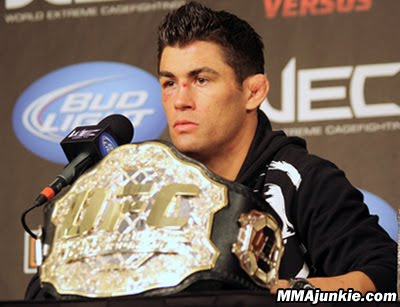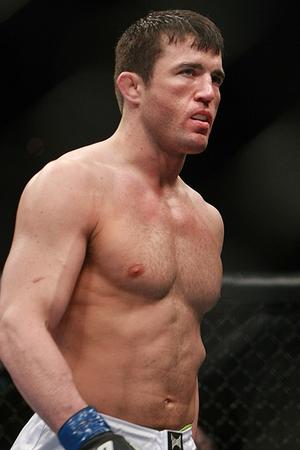 By Michael Ford (MichaelFord@mmaratings.net)
By Michael Ford (MichaelFord@mmaratings.net)
Last week, fellow writer Spencer Kyte discussed his Jorge Gurgel Theory, which he suggested was an impediment to the mixed martial arts becoming mainstream. While I agree with much of the article, I disagree with his contention that the growth of the sport is hampered by unsophisticated, uninformed fans. On the contrary, the existence of those fans is a symptom, not the problem itself.
In professional sports, there will always be a tension between being effective and being crowd-pleasing. And yet, these other sports don’t feel that the long-term viability of the sport is at stake when a game or series is poorly-rated, or fans find it boring. This is because those sports have a core of dedicated fans who follow the sport because of what the sport is. We’ll know that MMA is “in the mainstream” when *its* fans and commentators no longer feel the need to make apologies for the sport they are watching, and merely accept that casual fans will be less entertained by nuance, but that’s what makes them casual. The job of the informed fan is to educate the less-informed fan, and the job of announcers is to play the role of the informed fan for the uninformed masses.
When I watch the average sport’s pre-game show, a slew of experts offer their insight into how the game will likely play out, as well as suggest which strategies should be employed by each team in order to earn victory. MMA telecasts use their “pre-game shows” to hype the fights, and spend too-brief moments offering pre-fight analysis, instead focusing on fighters’ pre-fight trash about what they intend to do. Just as pre-game platitudes by pro athletes about “playing their game” offer limited insight, so too does this form of pre-fight coverage fill up airtime, without offering many avenues for education or analysis. That said, it is highly effective at getting fans into the fights, which are all promised to be barnburners. The problem, of course, is that not every fight can be a “knock-down, drag-out brawl.” Sure, some fighters might prefer to “stand and bang” to the delight of the live audience, but the job of the announcers should be to tell us when and why that isn’t a sound strategy, rather than reveling in the reckless abandon. A pitcher might just want to throw heat at opposing batters, or a quarterback might want to heave passes into double coverage, because that would be more “exciting,” but when that goes awry, the announcers invariably excoriate the player for placing excitement over winning.
But like Spencer mentions, the UFC incentivizes such behavior, by awarding large Fight of the Night bonuses to borderline choreographed displays of kickboxing, while not awarding such bonuses to legitimate “games of human chess” that may fail to captivate the audience. Given that these bonuses typically dwarf the average undercard fighter’s win bonus, the lesson that the announcers are sending to the fanbase is that cheers and boos dictate fighter compensation more than Ws and Ls.
This type of thinking infects the entire sport, as referees break up clinches more quickly, or stand up ground-based grapplers, because the live crowd has gotten restless. Instead of looking out for the safety of the fighters and maintaining the integrity of the competition, officials often see themselves as the instruments of ensuring that the crowd’s appetite for a “great fight” is sated. Fans, mindful of this, know that they can be a part of the show, and that their dictates can affect the outcomes of fights. (Imagine if crowd response determined whether fouls were called in a basketball game, or whether penalty flags were thrown in football games!) Instead of just cheering and booing based on fan allegiance, these audiences now typically cheer and boo “action” or “inaction.” Again, instead of steering the viewing audience away from the live audience’s ignorance, announcers typically endorse and promote those fans’ reactions.

 The problem with the pursuit of mainstream acceptance by hardcore fans is that it often evinces a lack of confidence that the sport can be viable on its own merits. The misguided and misinformed criticisms of out-of-touch sportswriters, and the observations of uninformed casual viewers, cannot be allowed to shape the discourse. Sure, there will be those who bemoan the sport’s brutality, while others jeer ju jitsu’s so-called “homosexual porn” imagery. However, the proper response from the sport isn’t to be cowed by it into apologetics, or to change its rules and presentation, so as not to offend their sensibilities. Nay, to be a fan of the sport is to accept the occasional aesthetic deficiencies, while bridging the gaps with “teachable moments” that allow new fans to embrace the nuances of the sport, rather than wallow in visceral, mindless “action.” When MMA truly becomes “mainstream,” we can expect to see fewer Jorge Gurgels, and more Jake Shieldses; hopefully the fanbase can handle the awkward moments.
The problem with the pursuit of mainstream acceptance by hardcore fans is that it often evinces a lack of confidence that the sport can be viable on its own merits. The misguided and misinformed criticisms of out-of-touch sportswriters, and the observations of uninformed casual viewers, cannot be allowed to shape the discourse. Sure, there will be those who bemoan the sport’s brutality, while others jeer ju jitsu’s so-called “homosexual porn” imagery. However, the proper response from the sport isn’t to be cowed by it into apologetics, or to change its rules and presentation, so as not to offend their sensibilities. Nay, to be a fan of the sport is to accept the occasional aesthetic deficiencies, while bridging the gaps with “teachable moments” that allow new fans to embrace the nuances of the sport, rather than wallow in visceral, mindless “action.” When MMA truly becomes “mainstream,” we can expect to see fewer Jorge Gurgels, and more Jake Shieldses; hopefully the fanbase can handle the awkward moments.



